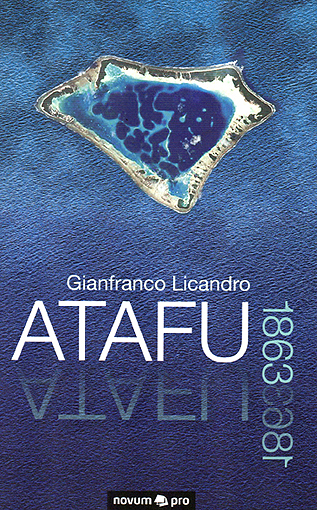
ATAFU 1863
According to a true event
Atafu, Tokelau (South Pacific), February 16th, 1863. Nuanua share a bitter fate with 36 other women islanders: her husband was captured together with all other men of the island, who were still capable of working, by the crew of the Peruvian ship “Rosa Patrizia”, to be sold as slaves in a far away country.
The loss of her husband awakes many memories in Nuanua, reaching back to their first encounter in Samoa and as far back as her childhood.
They got to know each other in Apia on Samoa in the house of August Unshelm, the consul from Hamburg and managing director of the company Godeffroy. The journey back to Nuanuas past is being staged with narrations (through the dialogue with Tala) and by means of displaying her thoughts through scenic events. Pictures of her feelings too are staged by means of lyrical recitations, combined with pieces of piano music.
A compilation of works of the most renowned composers of the first half of the nineteenth century such as Beethoven, Chopin, Liszt, Schumann with works of poets of the same period such as Eichendorff, Heine, Leopardi among others.
All characters have really existed with the exception of “Tala” and the piano player “Grazia Francesca”. All the names are truly depicted too: Maka, the missionary, who lived in Atafu, Henry Gee – his superior – August Unshelm the consul from Hamburg and Foli, Atafu’s chieftain (who had the nickname “Oli” given by his wife).
August Unshelm died in a shipwreck one year later, at the end of March 1864, whe a hurricane sank his ship “Charlotte” near the Fiji islands.
Foli never returned to Atafu. Of all the men who were abducted on February 16th, 1863, only one came back after 30 years….
Nuanua (in Tokelau language = “rainbow”) is not the real name of chief Foli’s wife. Unfortunately her true name is not known
It is not known what became of her. The only thing we know is, that she lost her and Foli’s child she was expecting , shortly after the 16th of February.
PROGRAMME
PROLOGUE
SCENE 1
NUANUAS SPEECH TO THE WOMEN OF ATAFU
SCENE 2
BEETHOVEN – ARNIM BRENTANO
Ludwig van Beethoven: Piano sonata in Ab-major Op. 110 (Grazia Francesca) 3’50”
Bettina von Arnim Brentano: Seelied (Europa)
SCENE 3
1. DIALOGUE NUANUA - TALA
SCENE 4
BEETHOVEN – LEOPARDI
Ludwig van Beethoven: Piano sonata in C#-minor „Mondscheinsonate“ Op. 27 Nr. 2 (Grazia Francesca) 6’33”
Giacomo Leopardi: La sera del dì di festa (Nuanua’s father: italian with supertitles)
SCENE 5
2. DIALOGUE NUANUA – TALA
SCENE 6
DIALOGUE NUANUAS FATHER – NUANUA CHILD
SCENE 7
3. DIALOGUE NUANUA – TALA
SCENE 8
CHOPIN – SCHOPENAUER, EICHENDORFF, ALBRECHT, HÜLSHOFF
Friedrich Chopin: Nocturne op. 9 Nr. 1 (Grazia Francesca) 6’49”
Adele Schopenauer: Könnt’ ich einmal, einmal nur (Europe)
Joseph Eichendorf: Mondnacht (August Unshelm)
Sophie Albrecht: An Ihn – Bitte an Wind und Wellen (Europe)
Annette von Droste - Hülshoff: Letzte Worte (Foli – Off voice).
SCENE 9
4. DIALOGUE NUANUA – TALA
SCENE 10
LEOPARDI: L’INFINITO
Giacomo Leopardi: L’infinito (Nuanua’s father: italian with supertitles)
SCENE 11
LISZT – ARNIM BRENTANO
Franz Liszt: Consolation Nr. 2 (Grazia Francesca) 3’28”
Bettina von Arnim Brentano (Europe): Wer sich der Einsamkeit ergibt
SCENE 12
5. DIALOGUE NUANUA – TALA
SCENE 13
DIALOGUE UNSHELM – FOLI
SCENE 14
6. DIALOGUE NUANUA – TALA
SCENE 15
MONOLOGUE UNSHELM
SCENE 16
CHOPIN – HEINE, AUGUST VON PLATTEN
Friedrich Chopin: Nocturne Op. 9 Nr. 2 (Grazia Francesca) 4’26”
Heinrich Heine: “Auf Flügel des Gesanges” (Unshelm)
August von Platten: “Tristan” (Unshelm)
SCENE 17
7. DIALOGUE NUANUA – TALA
SCENE 18
MONOLOGUE FOLI und 8. DIALOG NUANUA - TALA
SCENE 19
NUANUA-TALA-FOLI und LISZT – STORM
Franz Liszt: Consolation Nr. 3 (Grazia Francesca) 4’07”
Theodor Storm: Abends (Foli)
SCENE 20
TALA – VON SCHOBER
Tala reads “An die Musik” by Franz von Schober
SCENE 21
SCHUMANN - TRÄUMEREI
Robert Schumann: “Träumerei” (Grazia Francesca) 3’18”.



